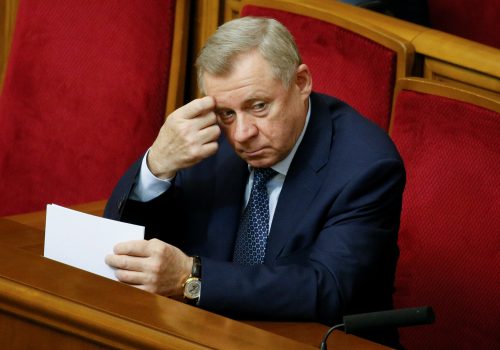In many instances, .01% of anything may seem like a negligible and insignificant portion. However, in an economy that struggles to recruit and retain top talent, the 20,000 Ukrainians, or .01% of the country’s total working population, who qualify as highly skilled labor working abroad are one of the factors why Ukraine consistently lags behind its neighbors.
According to the World Economic Forum Global Competitiveness Index, Ukraine’s capacity to retain talent ranks at an abysmal 129 out of 137 featured countries. Continuing failure by government and business to recognize and invest in people as Ukraine’s biggest economic driver is leading to an ongoing high-skilled migrant crisis. Simply put, the best and brightest are leaving.
With more than 10% of the country’s approximate 20 million labor force working abroad at any given moment, it is easy to understand why the flow of Ukrainian labor migrants has caught the attention of businesses, policy makers and the general public. According to World Bank data, low-skilled labor migration significantly contributed to the USD 16 billion in remittances that entered Ukraine’s economy in 2019. While highly skilled Ukrainians represent a relatively tiny portion of Ukraine’s migrant flows, their departure creates a deficit of Western-style top talent.
There are a number of key factors behind these departures, including macroeconomic and political uncertainty. For example, in the last six months alone, local salaries have deflated 18% in US dollar terms due to a falling exchange rate, while the National Bank of Ukraine’s Chairman has resigned citing political pressure. There is also a deficit of small- and medium-sized enterprises (SMEs) that are able to create a market of competitive compensation and attractive positions relative to neighboring economies.
Stay updated
As the world watches the Russian invasion of Ukraine unfold, UkraineAlert delivers the best Atlantic Council expert insight and analysis on Ukraine twice a week directly to your inbox.
In February 2020, the Zelenskyy administration green-lighted a loan program for SMEs. This scheme allocated UAH 2 billion to provide affordable loans to Ukrainians living abroad who wish to return home, or individuals residing in Ukraine who are considering starting a business. Aiming to stem the problem of mass emigration while stimulating Ukrainian’s entrepreneurial spirit, the program offers loans of up to UAH 1.5 million (roughly USD 55,000) with annual rates of 5%-9% for up to 5 years.
This is a welcome initiative. However, critics say the loan amount and interest rates are not enticing enough for serious consideration by those who are looking to grow medium-sized businesses that would provide the most economic value. Furthermore, the pandemic’s economic strain has caused conditions where risk-adverse behavior is embraced and entrepreneurship is put on hold. In order to grow the number of SMEs, the government must diversify its strategy for retaining, growing and attracting high skilled labor through innovative projects and partnerships across the public, private and NGO sectors.
There is fierce competition among nations in Central and Eastern Europe to attract top talent from one another, with many nations such as Estonia, Lithuania, and Poland publicly funding recruitment initiatives targeting neighboring professionals. Often their initiatives operate through targeting talent on social media through paid ads and redirecting users to websites offering easy relocation guides, government-supported business financing programs, job postings, consultations, and document processing.
To remain competitive with its neighbors, Ukraine must follow suit and allocate funds within its national investment agencies such as UkraineInvest or the National Investment Council to replicate the success of these programs. Ukraine has an opportunity to target Central and Eastern European entrepreneurs and tech companies who are looking to set up satellite offices. Ukraine’s proximity allows for regional entrepreneurs to maximize business efficiency and reduce costs without sacrificing on time-shifts, cultural differences, easy communication, and cost-effective travel. This could attract new investment while at the same time helping to retain highly skilled IT talent which currently departs in droves.
The government should also look to take innovative steps domestically and initiate a career development loan program in partnership with banks such as PrivatBank in order to offer reasonable interest rates for professionals looking to enhance their qualifications abroad. Currently, income levels for young professionals do not allow for the savings necessary to self-finance further professional education. It is common practice in North America for students to take loans to partly finance their education in combination with their savings. Allowing the same in Ukraine could significantly increase the supply of Western-trained professionals.
In the private sector, Ukrainian corporations should launch internal professional development programs to motivate employees, create loyalty, increase productivity, and support leadership succession planning. Understandably, corporations may be skeptical about investing significant funds in a single employee’s development. Many will fear that the employee will remain in the educational institution’s country or leave to a competing firm after graduation. However, best practice shows that organizations can mitigate risk through signing and enforcing contracts stipulating a return of funds if the employee no longer wishes to remain with the organization.
Eurasia Center events

To popularize the concept throughout the private sector, local business associations such as the American Chamber of Commerce, European Business Association and others should engage in a special awareness campaign, showcasing successful cases from abroad as well as local leaders who currently implement these practices.
Collaboration between the public sector and international donor organizations offers a promising launchpad for further development in growing and retaining highly skilled talent and creating value for the government. Establishing programs where there is a three-party agreement between donors facilitating education grants, large state-owned enterprises being readied for privatization, and candidates prepared to enter the SEO post-graduation could prove to be particularly efficient. Candidates could use their future employer for different practical case studies.
For now, international development and charitable organizations are bridging the gap by offering educational grants. Nevertheless, these programs have a limited capacity in servicing the educational ambitions of Ukrainian students wishing to attain top qualifications and return home. Growing national managerial institutions so that local talent does not have to look for greener pastures abroad means collaborating with industry-leading educational institutions and bringing their knowledge and talents to home soil.
Domestically, the Kyiv School of Economics (KSE), which is widely considered Ukraine’s premier business school, has recently secured a permanent campus thanks to a generous gift from Dragon Capital, Ukraine’s leading investment bank. This gift will assure that KSE has stable operations and can focus on building a quality business education product for the local population. Another good example is that of the Ukrainian Corporate Governance Academy, which has formed a relationship with one of the world’s top business schools, INSEAD, to offer their executive corporate governance education certifications in Kyiv by having professors fly in and lecture. This format has led to the certification of 264 top Ukrainian senior executives.
Ukraine’s future offers the promise of economic growth, but the speed and efficacy of this growth is only as good as the highly skilled talent driving it. The current Ukrainian administration and those that follow must address this long-term challenge. They must foster cross-collaboration between international donors, the private sector, and national institutions. Refocusing strategy on retaining, growing and attracting Ukraine’s highly skilled talent will always pay far higher dividends than the current inbound remittances sent home by the .01% who are currently working abroad.
Anton Waschuk is the SEED Grant Program Manager and Economic Leadership Program Coordinator at Western NIS Enterprise Fund. Andriy Kamenetskyy is an Account Executive for Ukraine, Azerbaijan, Belarus and Georgia at Microsoft, and WNISEF SEED Grant recipient and MBA graduate at UCLA.
Further reading
The views expressed in UkraineAlert are solely those of the authors and do not necessarily reflect the views of the Atlantic Council, its staff, or its supporters.

The Eurasia Center’s mission is to enhance transatlantic cooperation in promoting stability, democratic values and prosperity in Eurasia, from Eastern Europe and Turkey in the West to the Caucasus, Russia and Central Asia in the East.
Follow us on social media
and support our work
Image: Passengers prepare for departure at Boryspil International Airport outside Kyiv. May 24, 2020. REUTERS/Valentyn Ogirenko




